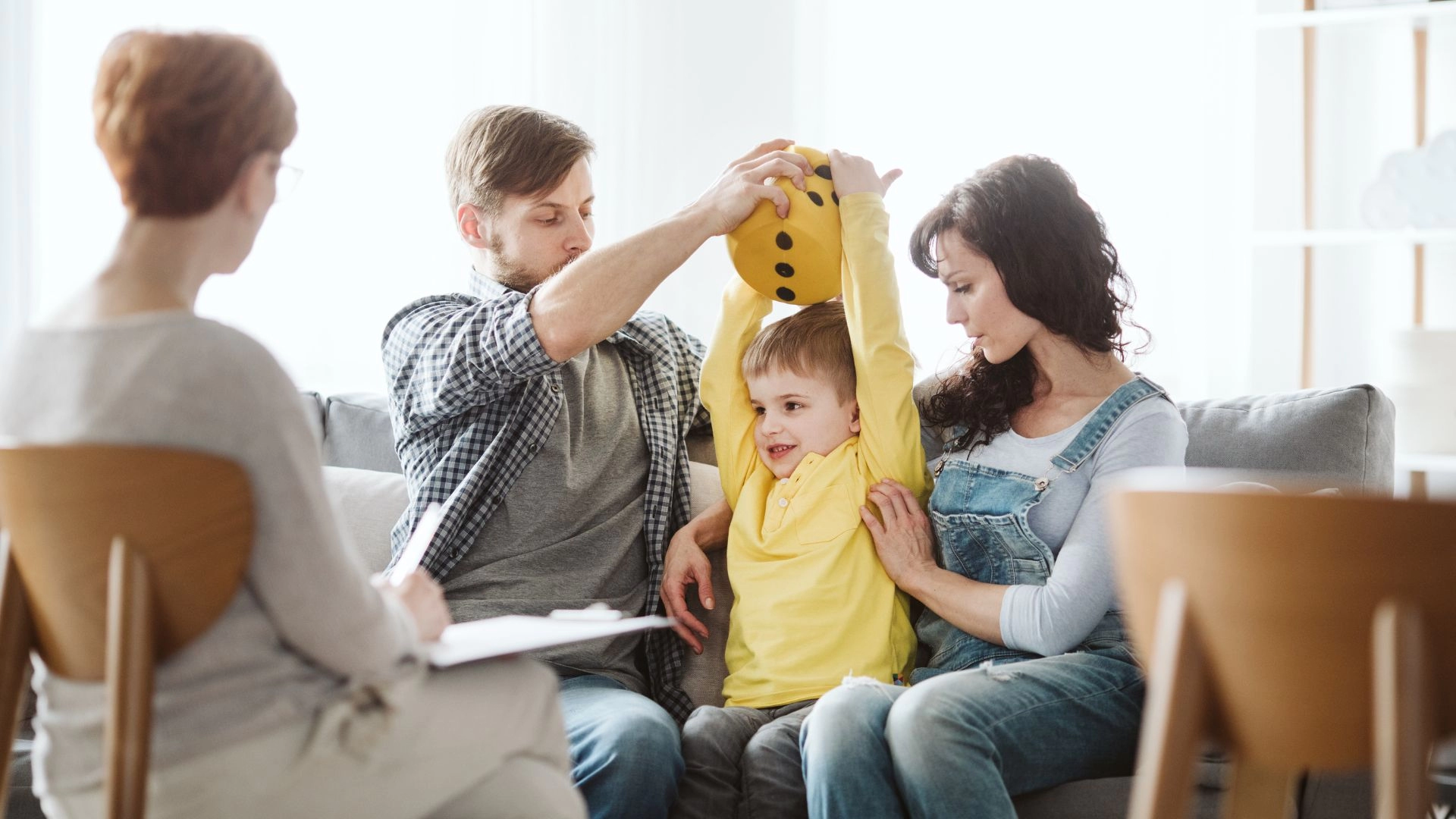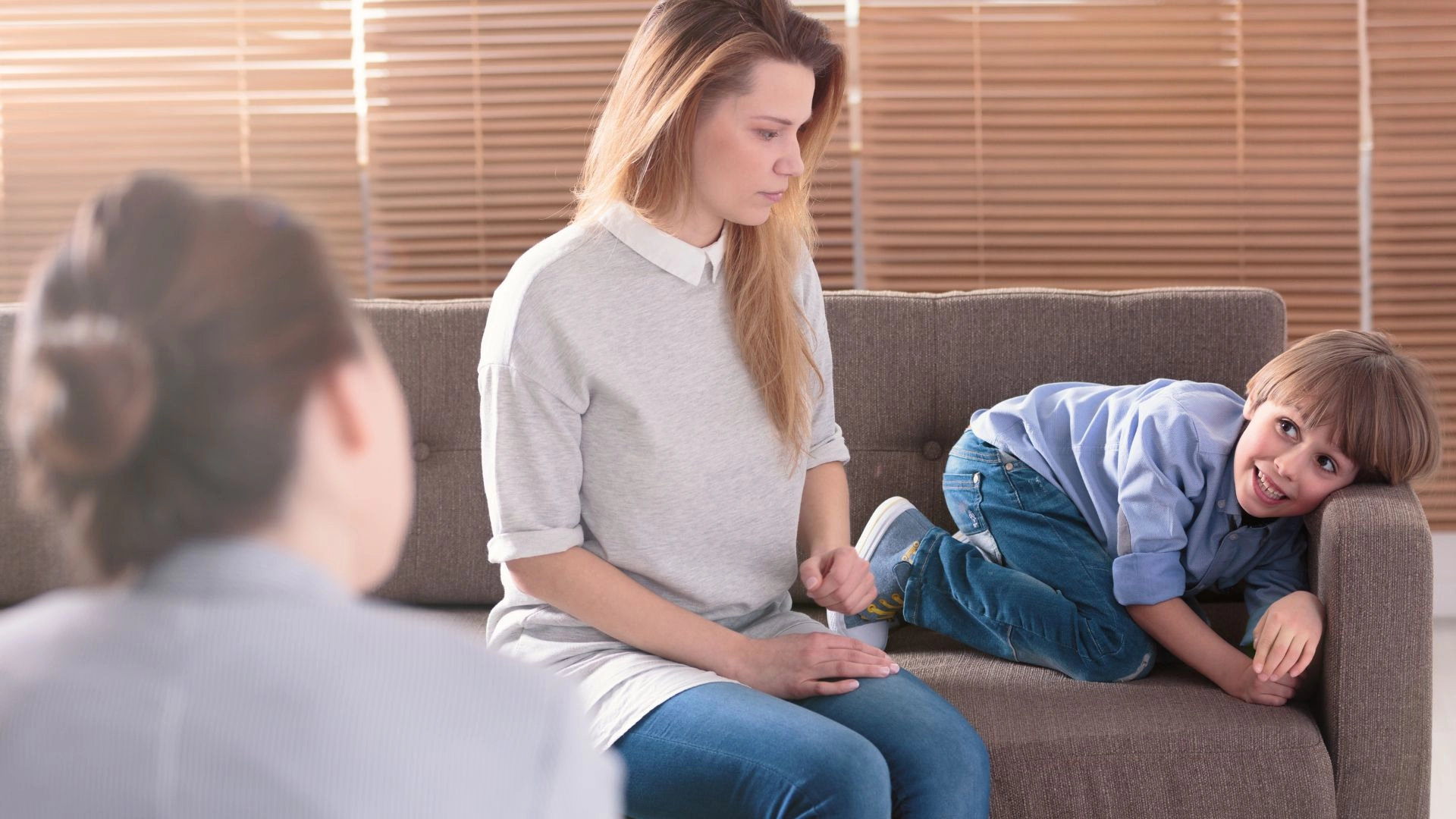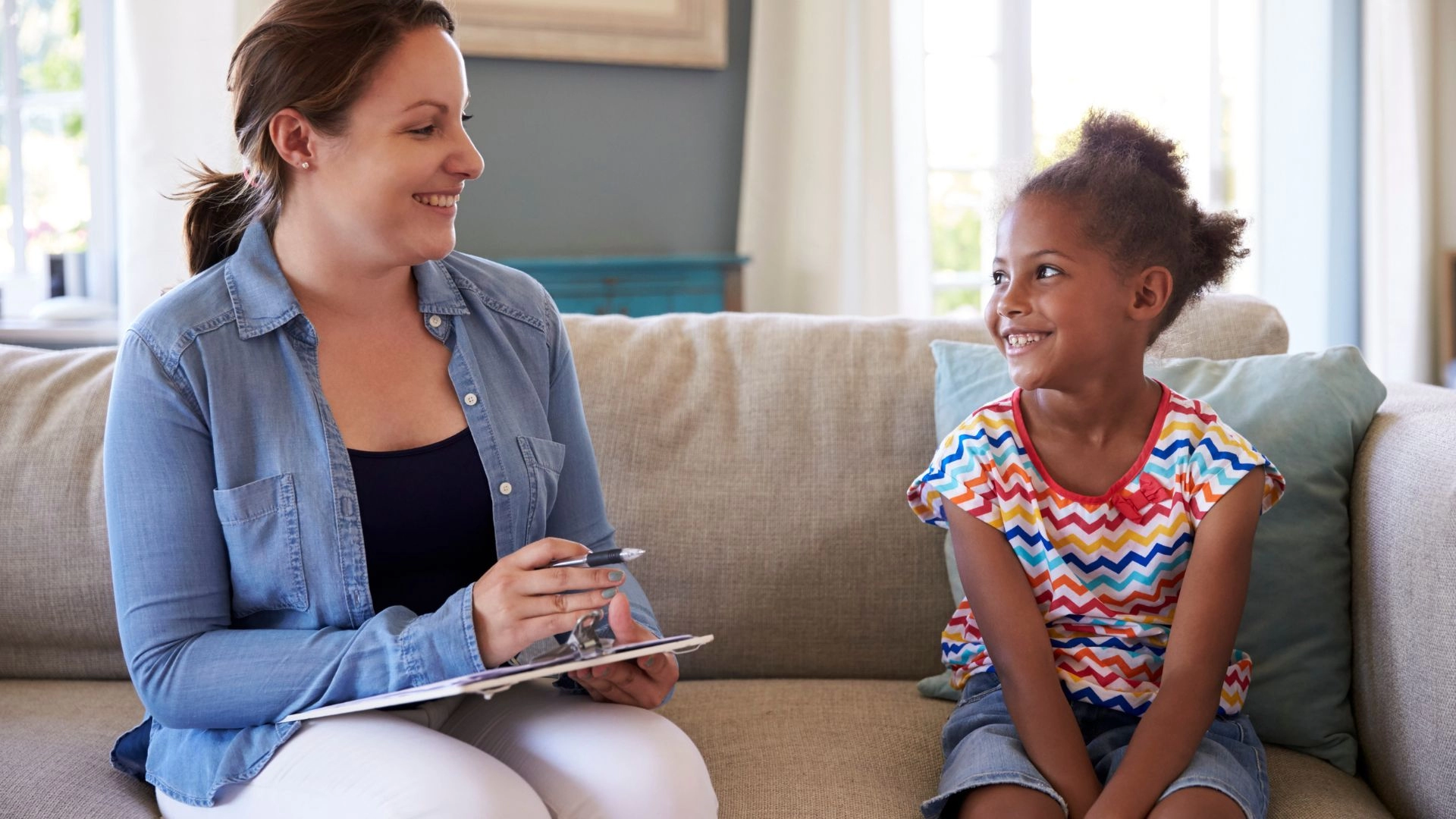We recognize how tough it can be to support a child with ADHD, and Child Counseling Therapy in Oakville is here to help. Our approach creates a safe space where children can express their feelings and learn effective coping strategies. Using techniques like cognitive-behavioral therapy and play therapy, we focus on improving impulsivity, emotional management, and social skills. We also emphasize the importance of parent involvement to strengthen family support. Together, we can nurture your child’s growth and emotional well-being. To explore more about our tailored services, you’ll find valuable insights that can further guide your journey.

About Child Counselling Therapy
Child counseling therapy is a compassionate approach that helps us understand and support children struggling with ADHD, enabling them to navigate their emotions and behaviors more effectively. In child therapy, we focus on creating a safe space where kids can express themselves freely, fostering emotional regulation skills vital for managing ADHD.
Utilizing techniques like cognitive-behavioral therapy, we guide children in recognizing patterns in their thoughts and behaviors, empowering them to make positive changes. Behavioral therapy is another effective method we employ, helping kids develop strategies to cope with challenges and improve their attention and impulse control.
Moreover, parent training for ADHD plays a significant role in this process. By equipping parents with tools and strategies, we can create a supportive environment that reinforces what children learn in therapy. Our goal is to provide thorough ADHD support, addressing not just the child’s needs but also those of the family.
For kids dealing with anxiety, therapy can be tailored to help them manage their feelings, ensuring they feel heard and valued. Together, we can foster resilience and growth, paving the way for a brighter future.
Understanding ADHD Symptoms, Diagnosis, and Its Effect on Child Development
Understanding the symptoms of ADHD is important for identifying the challenges children face and how these can affect their overall development and well-being. ADHD in children can manifest as inattention, hyperactivity, and impulsiveness, often leading to difficulties in school and social settings. An accurate ADHD diagnosis is essential, as it opens the door to effective ADHD management strategies.
With the right interventions, including child counseling therapy, we can help children navigate their unique challenges. Behavioral intervention techniques can provide children with tools to manage their symptoms, reducing ADHD-related anxiety and promoting emotional resilience. Additionally, participating in ADHD support groups can foster a sense of community and understanding for both children and parents.
It’s important to remember that each child’s journey with ADHD is unique. By recognizing the impact of ADHD symptoms on child development, we can work together to create supportive environments that nurture growth and learning. Therapy for ADHD in children can be a transformative process, helping them gain confidence and improve their social skills. As we continue to understand ADHD better, we can empower our children to thrive and reach their full potential.
How Child Counseling Helps in Managing ADHD
Therapeutic support plays an essential role in helping children with ADHD navigate their daily challenges, providing them with effective coping strategies and fostering emotional growth. Through child counseling therapy, we can create a safe environment where our kids feel understood and supported. This emotional support for children is crucial as it encourages them to express their feelings and experiences related to ADHD.
In therapy for kids, we often focus on developing ADHD coping mechanisms and strategies that empower children. Behavioral therapy for kids targets specific behaviors, helping them learn how to manage impulsivity and improve their attention span. These therapeutic interventions for children aren’t just about addressing symptoms; they promote overall child mental health services, enhancing self-esteem and resilience.

Using Cognitive Behavioral Therapy (CBT) to Treat ADHD
In our journey to support children with ADHD, Cognitive Behavioral Therapy (CBT) emerges as a powerful tool that helps them build skills to manage their symptoms effectively. This approach is particularly valuable in ADHD counseling, as it focuses on developing strategies that promote focus improvement and emotional regulation in children. Through structured sessions, we work with kids to identify negative thought patterns and replace them with healthier, more constructive ones.
CBT empowers children to learn essential ADHD coping skills that can greatly enhance their daily lives. By breaking tasks into manageable steps, we guide them to tackle challenges related to behavioral disorders in children. This therapy for school-aged children also includes practical exercises to reinforce focus improvement and emotional awareness.
As we explore various ADHD treatment options, it’s clear that CBT not only addresses the symptoms but also fosters resilience and self-confidence. Our goal is to create a supportive environment where children can thrive, develop essential coping mechanisms, and feel understood. Together, we can make a difference in their lives, equipping them with the tools they need to navigate their ADHD journey successfully.
Play Therapy: A Creative Solution for Children with ADHD
Play therapy offers a unique and engaging approach for children with ADHD, allowing them to express themselves and navigate their emotions through creativity and play. In our practice, we’ve seen how this method can be particularly effective in child counseling therapy for special needs children. By using play therapy techniques, we can help children engage in ADHD behavior management while fostering their emotional development.
Through imaginative play, kids can explore their feelings, confront anxieties, and even process experiences related to childhood trauma. This therapeutic environment encourages self-expression, promoting resilience and coping strategies essential for their growth. We focus on creating a safe space where children can freely express themselves, facilitating child resilience therapy that nurtures emotional well-being.
As we implement child therapy techniques tailored for ADHD, we recognize that play therapy is an invaluable resource not just for children but also for families. It offers a way for parents to understand their children’s struggles better and become more involved in their emotional journey. Ultimately, play therapy serves as a creative solution for troubled youth, helping them build essential life skills while having fun in the process.
School Counseling and Educational Support for ADHD
Understanding the challenges children with ADHD face extends beyond the therapy room and into the classroom, where school counseling and educational support play an essential role in their success. We recognize that ADHD can create unique obstacles, making it imperative for schools to provide tailored support. This is where effective school counseling comes into play, offering resources and strategies to help navigate ADHD challenges.
One essential component is the Individualized Education Plan (IEP) for ADHD, which outlines specific goals and accommodations tailored to each child’s needs. Classroom accommodations, such as preferential seating or extended time on tests, can greatly enhance learning experiences. We believe in the importance of collaboration between parents, educators, and counselors to guarantee consistent support.
Additionally, ADHD testing can provide insights that inform these plans, offering a clearer understanding of a child’s strengths and areas for growth. By leveraging ADHD resources, we can create a supportive environment that helps children thrive academically and emotionally. Together, let’s advocate for effective school support for ADHD, guaranteeing every child has the opportunity to succeed in their educational journey.
Strengthening Bonds with Parent-Child Therapy for ADHD
Strengthening the bond between parents and children with ADHD can be transformative, fostering open communication and deeper connections that support emotional growth and resilience. In our journey through parent-child therapy, we can explore effective child counseling therapy techniques that enhance the emotional well-being of our children. This approach not only benefits our kids but also empowers us as parents to implement ADHD parenting tips that create a supportive home environment.
Through parent-child therapy, we can develop strategies for child behavior modification that help our children manage their emotions and actions. We’ll learn together about stress management for children, helping them navigate challenges with confidence. Additionally, ADHD coaching can guide us in understanding our child’s unique needs and strengths, paving the way for effective early intervention therapy.
It’s essential to remember that we’re not alone in this journey. As we participate in therapy for children, we cultivate a nurturing atmosphere where our children feel valued and understood. By strengthening our bonds, we can create a foundation that supports their emotional growth and resilience, leading to a brighter future for our families.

Providing Emotional Support for Children Living with ADHD
Emotional support is essential for children living with ADHD, as it helps them navigate their feelings and boosts their self-esteem in a world that can often feel overwhelming. By providing emotional support for children, we can foster a safe environment where they feel understood and valued. Child counseling therapy plays a pivotal role in this process, allowing kids to express themselves and learn coping mechanisms for ADHD.
During an ADHD evaluation, we can identify specific challenges related to emotional dysregulation. With this understanding, we can implement ADHD therapy techniques that focus on emotional intelligence and resilience. Incorporating therapeutic play into our sessions not only makes the experience enjoyable but also reinforces fundamental skills in a non-threatening way.
Moreover, parenting support is vital in helping families develop strategies that promote child mental wellness. By working together, we can empower both children and parents to recognize and manage emotional responses effectively. When we combine emotional support with practical tools, we equip children with the skills they need to thrive despite the challenges of ADHD, ensuring they feel confident and capable in their daily lives.
Behavioral Therapy for Managing ADHD in Kids and Teens
Behavioral therapy offers a structured approach that can greatly enhance the ability of kids and teens with ADHD to manage their symptoms and improve their daily functioning. In our child counseling therapy sessions, we focus on child behavioral therapy techniques that empower children to develop coping strategies tailored to their unique needs.
By utilizing behavioral therapy for managing ADHD, we help kids and teens understand their attention deficit hyperactivity disorder, fostering awareness and self-regulation. The child-focused therapy we provide encourages positive behavior changes through reinforcement and skill-building activities.
Our therapy for kids also emphasizes ADHD education, equipping both children and their families with essential knowledge about the condition. Through child and adolescent counseling, we create a safe space where kids can express their feelings and challenges, promoting emotional growth and resilience.
In each child therapy session, we work collaboratively with parents and caregivers, ensuring they’re involved in the process and can support their child’s development. With this thorough approach, we aim to nurture their strengths, improve their social skills, and enhance their overall quality of life. Together, we can help children and teens navigate their ADHD journey with confidence and clarity.
The Benefits of Group Therapy for Children Coping with ADHD
Group therapy can be a powerful tool for children coping with ADHD, as it not only fosters connection with peers facing similar challenges but also provides a supportive environment for sharing experiences and strategies. Through group therapy for kids, we can help children understand that they’re not alone in managing their ADHD and child behavior disorders. This setting encourages open discussions about emotions and coping mechanisms, which are essential for emotional healing for children.
In these sessions, children can practice ADHD and social skills in a safe space, learning from one another’s experiences. They often engage in ADHD-friendly activities that promote teamwork and boost self-esteem. Additionally, trauma-informed therapy principles can be applied, ensuring that every child feels understood and accepted.
As we explore ADHD accommodations, we’re reminded that every child’s journey is unique. Group therapy allows for the exchange of practical strategies and insights that can be invaluable for parents and caregivers participating in pediatric counseling. Ultimately, this collaborative approach not only enhances coping skills but also nurtures lasting friendships, empowering children to thrive in their daily lives.
Family Therapy: Supporting ADHD Management in the Home
While group therapy offers valuable peer support, family therapy plays an essential role in reinforcing ADHD management strategies within the home environment. By participating in family therapy, we can better understand how ADHD affects our child and our family dynamics. This supportive therapy for children allows us to collaborate as a family unit, creating consistent routines and strategies that promote effective ADHD management.
In child counseling therapy, the focus is often on the individual child, but family therapy emphasizes the importance of the parent-child relationship. Through parent-child therapy, we can learn to communicate more effectively, address childhood emotional issues, and implement child-centered therapy techniques that benefit everyone involved.
In our sessions, we’ll explore ways to improve ADHD and organization skills, ensuring our child experiences a structured and nurturing environment. We’ll also discuss coping strategies to manage potential challenges that arise from ADHD, fostering a sense of understanding and teamwork within our family. Ultimately, family therapy strengthens our commitment to supporting our child, creating a harmonious home atmosphere where they can thrive and feel secure. Together, we can navigate the complexities of ADHD, making our home a place of growth and support.
Art Therapy as an Expressive Tool for Children with ADHD
Art therapy serves as a powerful expressive tool for children with ADHD, allowing them to communicate their feelings and experiences in a creative and supportive environment. Through art therapy for kids, we can help children explore their emotions and thoughts without the constraints of traditional language. This form of child counseling therapy is particularly effective for those who may struggle with verbal communication.
In our sessions with a child therapist, we utilize various art materials to encourage self-expression and creativity. This process not only fosters mental health in kids but also enhances their social skills. As an ADHD specialist, we’ve observed that art can be a calming outlet, reducing symptoms of anxiety, which is often a concern in therapy for childhood anxiety.
Moreover, art therapy aligns beautifully with play-based therapy, making it engaging and enjoyable for children. It allows them to express themselves in ways that traditional child psychotherapy may not. By incorporating art into our approach, we create a safe space for children to explore their feelings, build self-esteem, and improve their overall social skills, helping them thrive in their journey toward emotional well-being.
Grief Counseling for Families Navigating ADHD-Related Challenges
Steering through the complexities of ADHD can often lead to feelings of grief and loss for families, as we adjust to the emotional and behavioral challenges that accompany the condition. It’s essential for us to recognize these feelings and seek the right support. Grief counseling for children can be an important step in helping our kids process their emotions while managing ADHD and learning difficulties.
Through child counseling services, we can access specialized support that addresses not just ADHD, but also related issues like child anxiety treatment and child depression therapy. Adolescent counseling can further aid our teenagers in coping with their unique challenges, fostering resilience and emotional well-being.
Family support therapy provides us with a safe space to express our struggles and learn effective coping strategies together. Additionally, crisis intervention for children can be indispensable during particularly tough moments. We must also prioritize ADHD self-care strategies to help our children manage their symptoms more effectively. By embracing available resources, we can transform our grief into a pathway for healing, growth, and a deeper connection within our families.
Incorporating Mindfulness and Stress Management for Kids with ADHD
Incorporating mindfulness and stress management techniques can greatly benefit our kids with ADHD, helping them navigate their emotions and improve their focus in everyday situations. Mindfulness for kids can be a powerful tool, teaching them to recognize their feelings and thoughts without judgment. This practice not only addresses anxiety in children but also enhances their executive function skills, vital for managing ADHD and impulsivity.
In child counseling therapy, we often introduce child therapy activities that promote mindfulness, such as deep breathing exercises or guided imagery. These activities help our children develop coping strategies that they can use in stressful moments. Additionally, stress management for kids can involve simple lifestyle changes, like establishing a routine or engaging in physical activity, which can also improve overall well-being.
For teens, therapy for teens can incorporate these principles, providing age-appropriate strategies that resonate with their experiences. By actively engaging in mindfulness and stress management, we can empower our kids to take charge of their ADHD, leading to healthier emotional regulation and increased focus. Together, we can create a supportive environment that encourages these essential life skills, making a lasting difference in their daily lives.
Reach Out to Our Child Counselling Therapy Center for ADHD Care and Support in Oakville
If you’re seeking specialized support for your child’s ADHD, our Child Counseling Therapy Center in Oakville is here to help. We recognize how challenging it can be to navigate the ADHD diagnosis process and the impact it has on your hyperactive child and your family. Our dedicated team provides child counseling therapy tailored to meet the unique needs of every child, fostering ADHD awareness and insight.
We offer counseling for kids that addresses impulsive behavior and helps them develop essential coping strategies. Our psychological therapy for children not only focuses on your child but also incorporates child and family counseling, ensuring that everyone feels supported during this journey.
We know that many families are concerned about the role of ADHD medication. That’s why we emphasize the importance of thorough care—combining therapy and, when appropriate, medical options to create a balanced approach.
Reach out to us today. Together, we can work towards a brighter future for your child, filled with insight, empowerment, and growth. Let’s take this journey together, supporting your child every step of the way.

About Town of Oakville
Nestled along the shores of Lake Ontario, Oakville is a vibrant town that offers a supportive community for families seeking resources and opportunities for their children’s growth and well-being. As we navigate the challenges of ADHD, including inattentiveness, hyperactivity, and impulsivity, it’s comforting to know that we’re not alone.
At Oakville Child Counselling Theraoy, we find specialized services in child psychiatry, focusing on adolescent mental health. These resources aim to support our children as they face focus issues and the impact of ADHD on school performance. With dedicated professionals in our community, we can access tailored counseling that truly understands the unique challenges our kids face.
Living in Oakville, Ontario, we’re fortunate to have a network of support that includes therapists, educators, and fellow parents who share similar experiences. Together, we can foster an environment where our children can thrive academically and emotionally. By embracing the available resources, we can empower our kids to develop coping strategies and build resilience, helping them overcome the hurdles of ADHD. In Oakville, we’re committed to creating a brighter future for our children, one step at a time.

- Dundas Street (Highway 5)
- Trafalgar Road
- Lakeshore Road
- Speers Road
- Third Line
- Upper Middle Road
- Bronte Road
- Royal Windsor Drive
- Winston Churchill Boulevard
- Ford Drive
- Dorval Drive
- Rebecca Street
- Great Lakes Boulevard
- 16 Mile Drive
- QEW (Queen Elizabeth Way)
- North Service Road
- South Service Road
- Maple Grove Drive
- Burnhamthorpe Road
- Glenashton Drive
- West Oakville
- Falgarwood
- Kerr Village
- Clearview
- West Oak Trails
- Bronte
- Palermo
- Ennisclare Park
- Glen Abbey
- Uptown Core
- Oakville East L6K
- Oakville South L6L
- Oakville North L6H
- Oakville West L6M
- Oakville Northeast L6J
Frequently Asked Questions
What Age Should I Start Considering Counseling for My Child With ADHD?
When we think about starting counseling for our child with ADHD, it’s important to contemplate their specific needs and challenges. We should look for signs of struggle, whether it’s with focus, social interactions, or emotional regulation. Early intervention can make a significant difference, so if we notice behaviors that concern us, it’s worth exploring counseling options. Talking to a professional can help us decide the best timing for our child’s unique situation.
How Long Does Child Counseling for ADHD Typically Last?
When we think about how long child counseling typically lasts, it’s crucial to remember that every child’s journey is unique. Generally, sessions might continue for a few months to a couple of years, depending on individual needs and progress. We can expect to see improvements within a few weeks, but lasting change often takes time. It’s vital to be patient and supportive throughout this process, as it can lead to significant growth and development.
Are There Any Medications Used Alongside Counseling for Adhd?
When it comes to managing ADHD, we often find that medications can be used alongside counseling to enhance the overall treatment. These medications typically aim to improve focus and reduce impulsivity, helping our child engage more effectively in therapy. It’s crucial to consult with a healthcare professional to determine the best approach for our specific situation. By working together, we can create a balanced plan that supports our child’s needs.
How Can I Support My Child’s Therapy at Home?
Supporting our child’s therapy at home involves creating a consistent routine and open communication. We can set aside time for activities that reinforce what they learn in therapy. Encouraging our child to express their feelings and practicing coping strategies together can also help. It’s important to celebrate their progress, no matter how small, and to be patient with setbacks. By being involved, we’re showing our child that we’re in this together.
What Qualifications Should I Look for in a Child Counselor for ADHD?
When we’re looking for a child counselor for ADHD, we should prioritize their qualifications. It’s important they have a degree in psychology or counseling, along with specialized training in ADHD. We should also check for licensure and experience working with children. Additionally, we can consider their approach to therapy—whether it’s evidence-based and child-friendly. Trusting our instincts about their rapport with our child is essential too.
